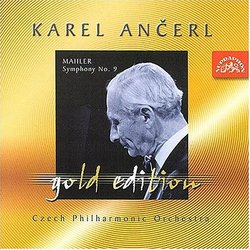| All Artists: Gustav Mahler, Karel Ancerl, Czech Philharmonic Orchestra Title: Ancerl Gold Edition 33: MAHLER Symphony No. 9 Members Wishing: 1 Total Copies: 0 Label: Supraphon Release Date: 10/26/2004 Album Type: Import Genre: Classical Styles: Historical Periods, Modern, 20th, & 21st Century, Symphonies Number of Discs: 1 SwapaCD Credits: 1 UPCs: 675754789220, 099925369323 |
Search - Gustav Mahler, Karel Ancerl, Czech Philharmonic Orchestra :: Ancerl Gold Edition 33: MAHLER Symphony No. 9
 | Gustav Mahler, Karel Ancerl, Czech Philharmonic Orchestra Ancerl Gold Edition 33: MAHLER Symphony No. 9 Genre: Classical
|
Larger Image |
CD Details |
CD ReviewsA unique view on Mahler's swansong Larry VanDeSande | Mason, Michigan United States | 10/14/2005 (4 out of 5 stars) "The Mahler Symphony No. 9 is typically seen as Mahler's omen of death because it was written at the time of the composer's heart ailment and the death of his daughter. Endearing stories about composers not outliving their Ninth Symphonies (Beethoven, Schubert, Bruckner among others) contribute to the legend that the Mahler 9 portrays the end of the composer's life. In this performance, Karel Ancerl takes a unique view of the music. Compared to other versions I have heard including the Haitink, Lopez Cobos and Karajan's 1982 concert version -- which most critics consider the benchmark performance of this score -- Ancerl's performance at first seemed "fast" to me. His tempo in the first movement seemed almost jaunty compared to others and his total time of 78:53 is rapid compared to most recordings. However, as the vast first movement continued to unfold, an alternate description of the music began to appear. Ancerl's approach was no longer universally fast; it was more episodic, moving from urgency to tentativeness to happiness to victorious emotions. At about 11:35, Ancerl suddenly crashes and returns to the depth of despair, with happiness recurring at 15:30. And this with 11 minutes to go in the first movement! It is quite a contrast to Karajan's outlook of extended tragedy. The second movement landler is more traditional in Ancerl's hands, with the Burleske in the third movement becoming more of a grotesque dance of instruments than the other versions I've heard. In the finale, where Karajan made his name with this work by maintaining tension throughout the more than 30-minute span, Ancerl projects extended sorrow without tension while maintaining the pain inherent to Mahler's end of life vision. It later morphs to stream of consciousness before evolving to the final inevitable abyss of nothingness that critics and musicologists testify is Mahler's end. I enjoy this performance, in which the Czech Philharmonic Orchestra plays with authoritative virtuosity. Recorded in 1966 in the notoriously clangorous Rudolfinum, the sound on the Ancerl "Gold Edition" CD has been improved and is in league with modern DDD recordings. Every instrument can be heard and the recording is head and shoulders above the Karajan 1982 classic. All told, this is a fine performance from one of the eminent conductors from the golden era of classical recordings in sound that rivals the best from today. For $10 or less, this is excellent value and should be considered by all Mahler lovers." A superb interpretation of Mahler #9 L. Johan Modée | Earth | 11/01/2004 (5 out of 5 stars) "This classic Karel Ancerl recording is, in my opinion, one of the best accounts of Mahler's ninth symphony that is available at present. Here we have it in a new remastering, which improves the original stereo sound. The playing of the orchestra is outstanding, especially the brass department (note the typical horn vibrato) and the recording quality is very good for its age. But, above all, this CD is to be treasured for Ancer's superb interpretation, which is as good as an interpretation can be: moving, powerful, balanced, convincing, non-mainstream, and provoking. Strongly recommended! " Absolutely crushing Mahler!! A. Vetter | NY | 07/31/2005 (5 out of 5 stars) "This is a great version of the 9th.
I have particularly come to enjoy the last two movements. The neurotic elements of the 3rd and the heavenly parts of 4 sell it to me. You can't miss with this recording. Enjoy!!" |

 Track Listings (4) - Disc #1
Track Listings (4) - Disc #1